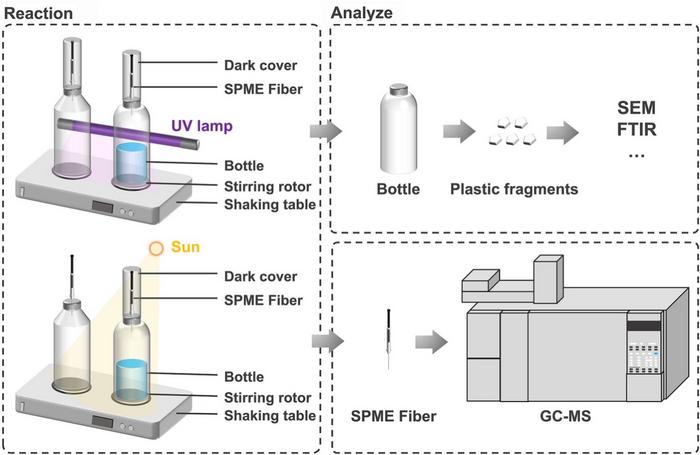Research from Jinan University has uncovered alarming evidence about the safety of plastic water bottles when exposed to sunlight. The study shows that ultraviolet-A (UV-A) radiation and solar exposure cause these containers to release potentially harmful volatile organic compounds (VOCs), raising serious concerns about drinking water safety and storage practices.
Plastic Bottles: A Trojan Horse for Toxic Compounds
The research team, led by Dr. Huase Ou, examined six types of plastic water bottles under UV-A and solar irradiation. Their findings revealed that all tested bottles emitted a complex mixture of chemicals, including alkanes, alkenes, alcohols, aldehydes, and acids. More alarmingly, highly toxic VOCs, some of which are known carcinogens like n-hexadecane, were identified among the emissions.
Dr. Ou stated, “Our findings provide compelling evidence that plastic bottles, when exposed to sunlight, can release toxic compounds that pose health risks. Consumers need to be aware of these risks, especially in environments where bottled water is exposed to sunlight for prolonged periods.”
Implications for Public Health and Industry Practices
The study’s results have far-reaching implications for both consumers and the bottled water industry. As the market for bottled water continues to grow, the urgency for safer alternatives becomes increasingly apparent. The research highlights the need for improved manufacturing practices, better material selection for water containers, and enhanced consumer awareness.
Furthermore, the study suggests that prolonged exposure to sunlight leads to an increased concentration of VOCs, indicating a growing cumulative risk over time. This finding underscores the importance of proper storage and handling of bottled water, particularly in sunny environments.
The research, published in Eco-Environment & Health, not only sheds light on the chemical stability of polyethylene terephthalate (PET) bottles but also calls for stricter industry regulations and safety standards. As consumers become more aware of these potential risks, the demand for safer, more sustainable packaging solutions is likely to increase.
Moving forward, this study serves as a crucial step towards understanding and mitigating the health risks associated with plastic water bottles. It emphasizes the need for continued research into safer materials and production methods to ensure the safety of bottled water consumers worldwide.
Additional Resources on VOCs in Plastic Water Bottles
Here are three additional resources you can explore to learn more about VOCs released from plastic water bottles exposed to sunlight:
1. The Dark Effects of the Sun on Plastic Drinking Bottles
3. Sunlight and plastic: A risky combination for bottled water safety
If our reporting has informed or inspired you, please consider making a donation. Every contribution, no matter the size, empowers us to continue delivering accurate, engaging, and trustworthy science and medical news. Independent journalism requires time, effort, and resources—your support ensures we can keep uncovering the stories that matter most to you.
Join us in making knowledge accessible and impactful. Thank you for standing with us!

